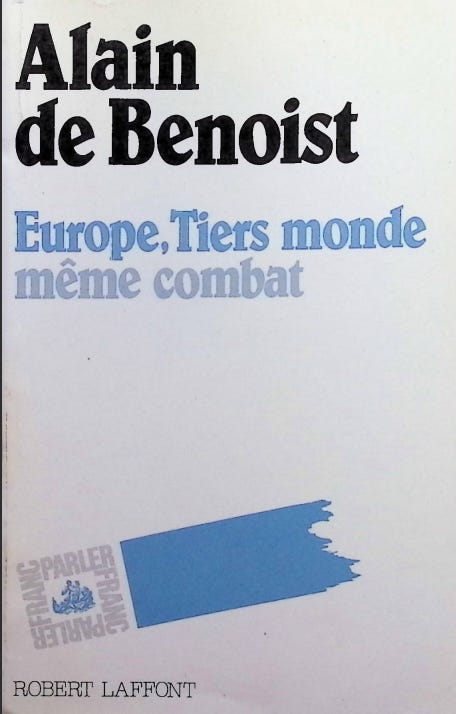My Review of «Europe, Tiers monde, même combat» (Europe, Third World, Same Fight)
Alain de Benoist proposes a "third way" that rejects the dominance of both American-led capitalism and Soviet-style communism in favor of preserving cultural identity and national autonomy.
Here is my summary/review of Alain de Benoist’s «Europe, Tiers monde, même combat» (Europe, Third World, Same Fight). This book was written in 1986 amidst the Cold War. At the time, it made sense geopolitically for Europe to consider an alliance with the Non-Aligned Movement in opposition to the USA and the USSR. I provided this summary/review since it is unlikely that this book will ever be fully translated and published in English - the ideas proposed in the book are dated and the audience for the book is virtually non-existent. However, I felt it was important and relevant to the historical understanding of the European New Right. I wanted to clarify the positions held by thinkers in the movement at that time.
In «Europe, Tiers monde, même combat» (Europe, Third World, Same Fight) Alain de Benoist argues that Europe and the Third World, despite their apparent differences, share a common geopolitical position that could allow them to forge a "third way" independent of the American and Soviet superpowers.
The book begins by examining the history of colonial ideology and the evolution of "Third Worldism" since World War II. De Benoist argues that traditional left-right political divisions have rarely corresponded to the actual forces at play regarding Third World issues. He suggests a "new Third Worldism" is emerging today that differs significantly from previous versions.
De Benoist then analyzes the current situation of the Third World, arguing that dominant Western ideologies are largely responsible for its continued subordinate status. He critically examines the notion of "development" as typically conceived in the West and contends that both liberal capitalist and socialist solutions are inadequate for the Third World. Instead, he proposes a new international economic order based on large zones of self-centered development, which he believes can restore diversity and richness to the world.
The author frames the key choice as between an ideology of universal human rights versus defending the cause of distinct peoples. He firmly chooses the latter, arguing that in an era of global uniformity and the death of rooted cultures, peoples must be free to construct their own destinies apart from Western or Eastern models. For de Benoist, supporting the Third World means advocating for non-alignment and rejecting the Western obsession with economics.
De Benoist criticizes both old-style colonialism and more recent forms of Western intervention in the Third World. He argues that attempts to impose Western-style development and modernization have often been destructive to traditional cultures and social structures. At the same time, he is critical of leftist "Third Worldism" that romanticized Third World revolutionary movements, seeing them as a replacement for Western proletarian revolution.
The book contends that true decolonization remains to be achieved, as new forms of economic and cultural domination have replaced direct political control. De Benoist sees the current international economic system, based on free trade and comparative advantage, as fundamentally unfair to developing countries. He argues it traps them in dependent relationships and prevents autonomous development.
As an alternative, de Benoist proposes a model of self-centered, autonomous development for large regional blocs. This would allow countries to prioritize internal needs and cultural values over integration into the global market. He cites examples like Japan's economic policies as a potential model. De Benoist also calls for a new international monetary system not based on the dominance of the US dollar.
The author sees potential for Europe to play a key role in fostering a new non-aligned movement together with the Third World. He argues that Europe, caught between the US and USSR, shares common interests with developing countries in resisting superpower domination. De Benoist envisions a multipolar world order that would allow for greater diversity of political and economic models.
Throughout the book, de Benoist emphasizes the importance of preserving distinct cultural identities and opposing what he sees as the homogenizing effects of both Western capitalism and Soviet communism. He defends the right of peoples to maintain their traditions and chart independent paths of development. The author is highly critical of universalist ideologies, whether liberal human rights discourse or Marxist internationalism, seeing them as covers for Western/Northern domination.
De Benoist positions his "new Third Worldism" in opposition to both old-style colonialism and leftist revolutionary romanticism. He advocates supporting Third World autonomy while rejecting guilt-based aid or attempts to remake these societies in the Western image. The book calls for Europeans to recognize their commonalities with the Third World and join in resisting the superpowers.
In conclusion, de Benoist argues that defending the Third World means promoting non-alignment, breaking with Western economic obsessions, and anticipating new political alignments of the future. He sees potential for Europe and the Third World to join in charting an independent course between the capitalist West and the communist East. The book presents this as key to preserving global diversity and allowing peoples to determine their own destinies.






Reflects Italy and France